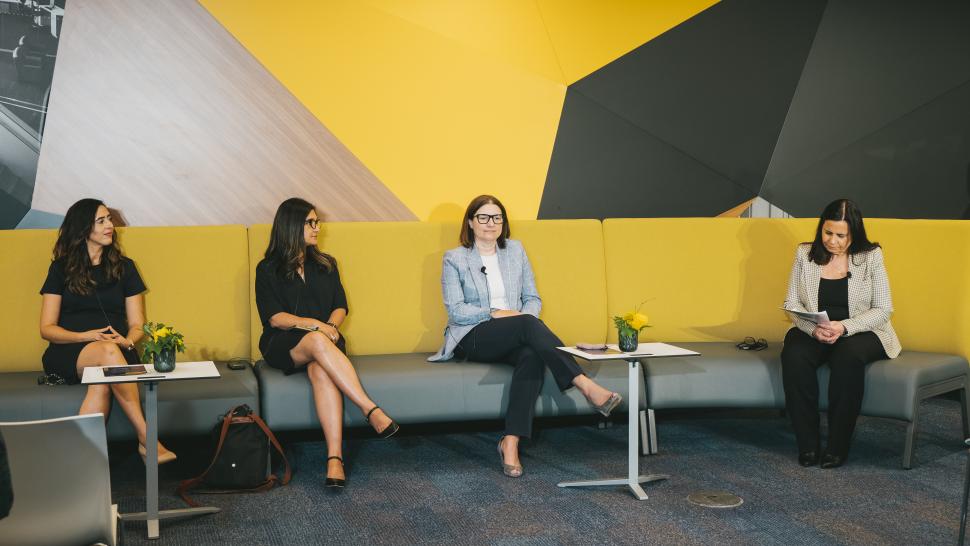
While the COVID-19 pandemic has affected workers in a variety of sectors, it’s having a profound impact on women in the workforce.
That impact was a topic of discussion when the Humber International Graduate School hosted its Women, the Pandemic and the Future of Work panel talk on June 28. It was the second in their event series EnVision the Future World of Work.
It was moderated by Humber’s Senior Vice-President, Academic, Gina Antonacci and featured panelists Andrea Spender, CEO of The Prosperity Project, Monika Tamber, director, Security Governance with Payments Canada, and Zenia Wadhwani, executive director of the Woodbine Cares Foundation.
Spender, whose organization is a registered charity that was founded to mitigate the impact of the COVID-19 pandemic on Canadian women, revealed some startling statistics about how women are being affected. She said that her organization’s recent Canadian Households Perspective survey found that overall workforce participation for women has dropped from 70 per cent to 62 per cent.
“It’s taken a long time to get women’s workforce participation up to that level and the fact we could lose such a large percentage in such a short time is very alarming and really underscores the impact of the pandemic,” said Spender.
She added that close to half of women surveyed said they would quit their job if they had to return to in-person work five days a week and that nearly two-thirds said they would turn down a promotion so they could continue with the flexibility they have of working from home. Many of the respondents said their home responsibilities have increased during the pandemic, which included child and elder care.
Tamber said the pandemic has had a pronounced impact on women in the technology industry. In 2019, it was projected that the percentage of women in the sector would grow from 23 per cent to 33 per cent by 2022 but there was a “huge” plateau in that period due to the pandemic, said Tamber.
There was also an exodus of women from the sector with Tamber saying four times more women than men left the workforce. There were a variety of reasons for this including layoffs, which she said affected women more, and that many women had increased responsibilities at home during the pandemic after their children switched to virtual learning due to a lack of childcare.
As well, she said women were eight times more likely to provide care for a sick child or elder and that 50 per cent of women in the industry couldn’t take on additional work responsibilities due to responsibilities at home.
“The pandemic has affected everybody regardless of gender but has highlighted the gender gap that already existed,” said Tamber.
When it came to what can be done to keep women in the workforce, the panelists offered a variety of suggestions.
Wadhwani said the provincial government could do better at supporting paid sick leave and pay equity, among other suggestions, but has stepped up for more affordable childcare.
Tamber said flexibility in the workplace is important. Returning to the office five days a week doesn’t work for many women and Tamber suggested that companies could try other ideas such as offering paid sick leave to those who need to take care of loved ones who are ill.
“The future of work has changed, period,” added Wadhwani. “Those CEOs and leaders who think you can just pull everyone back into a five-day work week are going to lose a lot of good people very fast.”
Affordable, quality childcare will help keep women in the workforce, added Spender. She also called on workplaces to focus on the results its employees produce rather than the location that they’re working – whether that’s at home or in the office.
“The organizations that do present the well thought out, progressive models are going to win the war for talent, as we call it, and people are going to switch to those places who do that,” said Spender.
The EnVision series is offered through Humber’s Industry and Community Connector Hub at the International Graduate School (IGS) in downtown Toronto. It looks at the impact of the COVID-19 pandemic on societies, economies and businesses and brings together leaders to discuss issues and possible paths forward to adapt to new realities, ways of thinking and doing, learning and working.
Future sessions will explore the pandemic’s impact and paths forward to create more equitable workforces through equity, diversity and inclusion frameworks, key issues around cybersecurity, and what the trajectory for the future in work means for space, conceptualization and leadership competencies.
Find out more about the Industry and Community Connector Hub on the Humber IGS website.